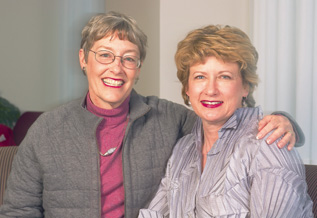 |
Ann Goldstein, left, and Cheryl Cooper share a unique bond. Goldstein’s 2002 kidney transplant was made possible by Cooper donating a kidney. |
Two years ago Ann Goldstein of Omaha was one of the 80,000 persons nationwide facing these circumstances. Fortunately, the unwavering kindness of a friend saved her life.
For years Goldstein suffered from inherited polycystic kidney disease – – a disease that claimed the lives of her mother and brother. In 2002, she was tested for a kidney transplant, and shortly thereafter her name was added to the national list for donor organs.
Goldstein said her physicians indicated it would take time. “I understood it could be years and that patience counts, so I adjusted my mind-set accordingly,” she said.
As Goldstein’s health continued to fail, family members and friends were tested as possible donors. Her close friend, Cheryl Cooper, was found to be a match. On May 3, 2002, the husband/wife transplant surgeon team of R. Brian Stevens, M.D., Ph.D., and Lucille Wrenshall, M.D., Ph.D., directors of UNMC’s kidney and pancreas transplantation program, successfully performed the transplantation at UNMC/The Nebraska Medical Center.
Now, two years later, Goldstein says she has “absolutely returned to a full life.” She also says it’s difficult to find the words to express her gratitude to a friend who was willing to share life. “It seems so trite to say, but true; it truly was a gift of life,” she said.
Goldstein also extends her gratitude to two other individuals who made a significant gift as well – – one she believes will have long-term benefits for transplantation medicine.
On the first anniversary of Goldstein’s transplant, her in-laws, Leonard and Shirley Goldstein, made a $100,000 gift to the University of Nebraska Foundation to support transplantation research. The Goldsteins said the donation was a gesture of appreciation for the physicians who “gave Ann back to us.”
“We were so grateful for what they did, that the least we could do was make a gift to the University’s transplant research program,” Leonard Goldstein said. “We feel Omaha has a jewel in the Medical Center and its research programs. Medical progress has been so great in the last few years, and it’s all due to research.”
The funding presently supports the work of Dr. Stevens and colleagues who are conducting diabetes research in the development and use of xenogeneic (animal) tissue for islet transplantation. Preliminary results have provided data that someday could help eliminate the two greatest obstacles in transplantation medicine.
“The most important challenge to transplantation today is the lack of organs,” Dr. Stevens said. “The other is that today we have to rely on anti-rejection drugs to make a transplant successful, and anti-rejection therapy is toxic.”
Dr. Stevens said the Goldstein gift enabled UNMC researchers to conduct experiments showing that pancreas tissue from juvenile pigs (the animal most suitable for supplying grafts for humans) can be matured into islets – – clusters of specialized insulin-producing cells – – and transplanted successfully into diabetic experimental animals.
In these experiments, Dr. Stevens collaborated with William Beschorner, M.D., of Ximerex, Inc., (pronounced “ki-mare-ics”) to subject some of the animals to pre-transplantation treatments developed by Dr. Beschorner during years of studying graft rejection. These treatments modify the donor pig by injecting bone marrow from the recipient animal before transplantation and reduce or eliminate the need for anti-rejection therapy after transplantation. Four animals transplanted showed graft function within a month of transplantation, and two animals needed no anti-rejection therapy.
“This fund has been extraordinarily important for our program,” Dr. Stevens said. “It provided us with support for performing these initial experiments, and now it appears we are one step closer to doing xenotransplantation (putting animal organs or tissues into humans). The animals we studied no longer require insulin therapy, and we achieved this without pancreas transplantation or treating them with anti-rejection drugs. If confirmatory studies prove our initial observations correct, it will represent an extraordinary breakthrough.”
For more information on how to support transplantation research at UNMC, call the University of Nebraska Foundation in Omaha at (402) 595-2302.